新概念英语第三册 Lesson 22 By heart 课件(共21张PPT)
文档属性
| 名称 | 新概念英语第三册 Lesson 22 By heart 课件(共21张PPT) | 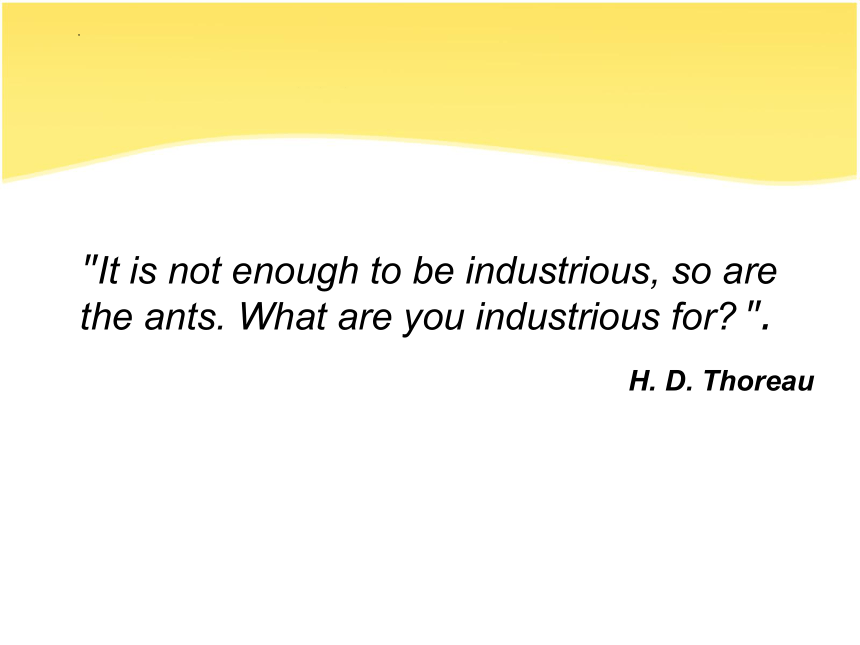 | |
| 格式 | pptx | ||
| 文件大小 | 164.3KB | ||
| 资源类型 | 教案 | ||
| 版本资源 | 新概念英语 | ||
| 科目 | 英语 | ||
| 更新时间 | 2024-02-21 12:37:18 | ||
图片预览

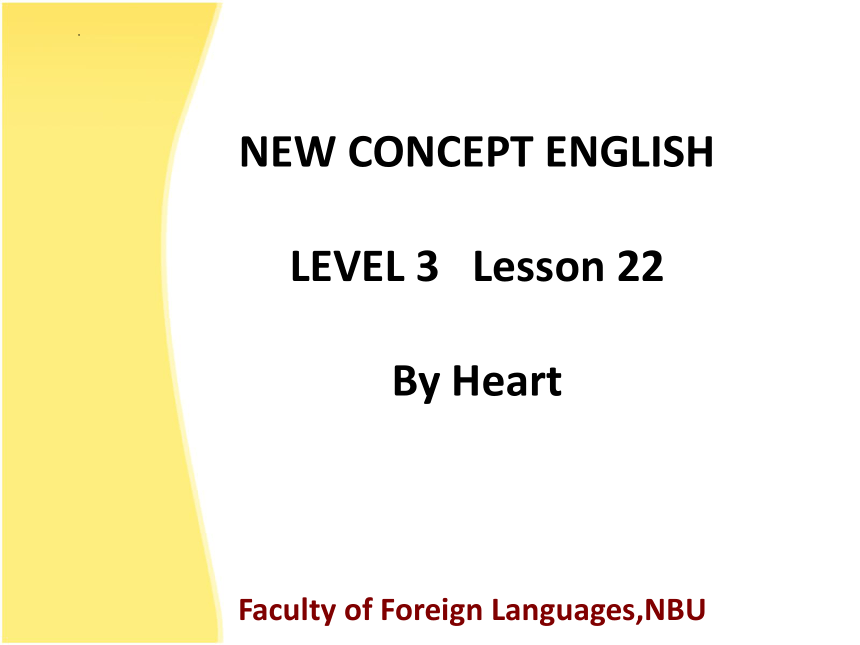
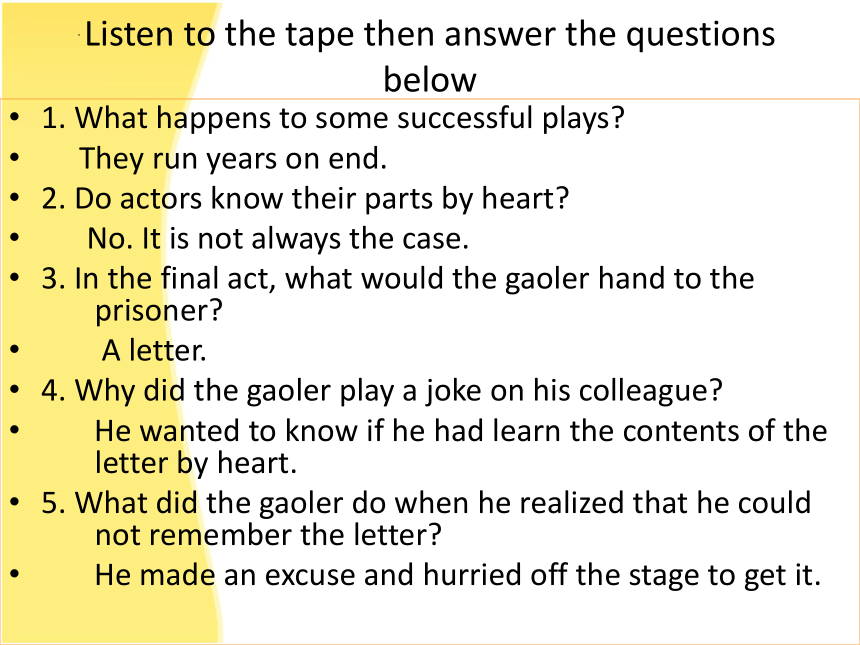
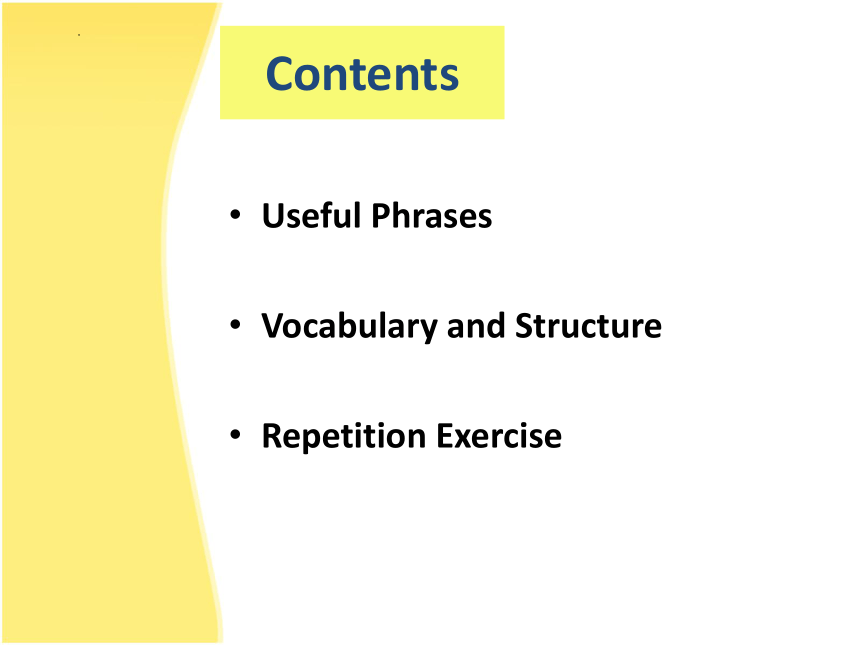
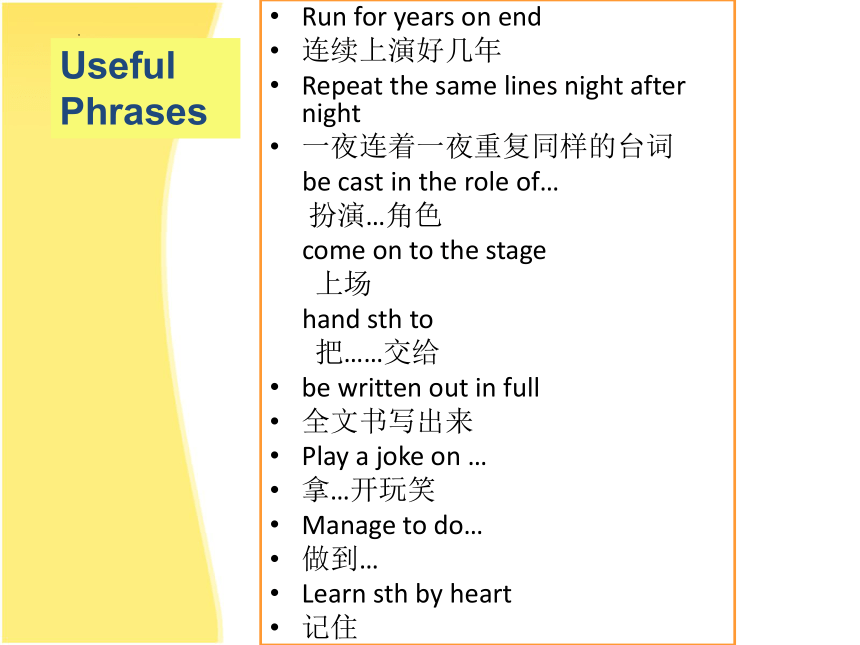
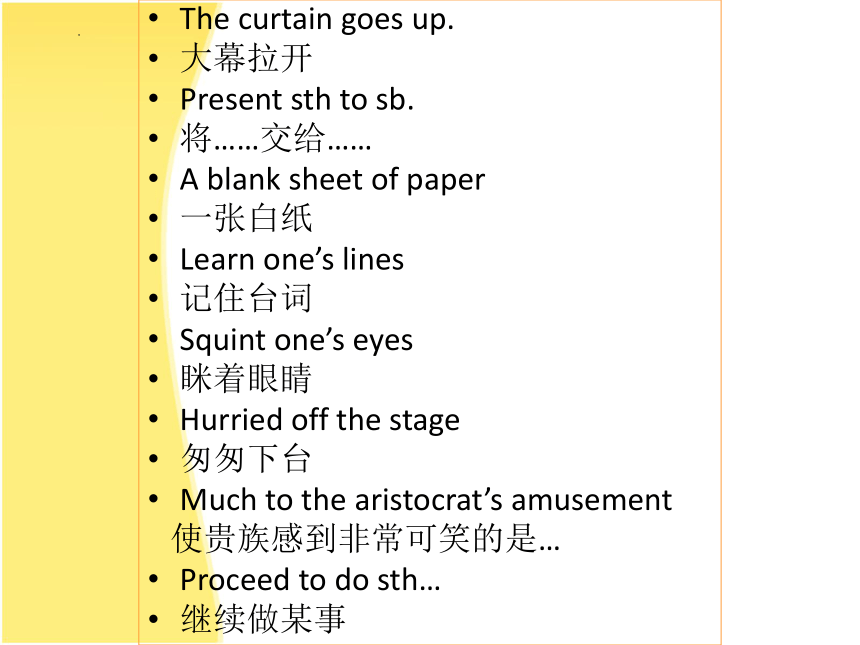
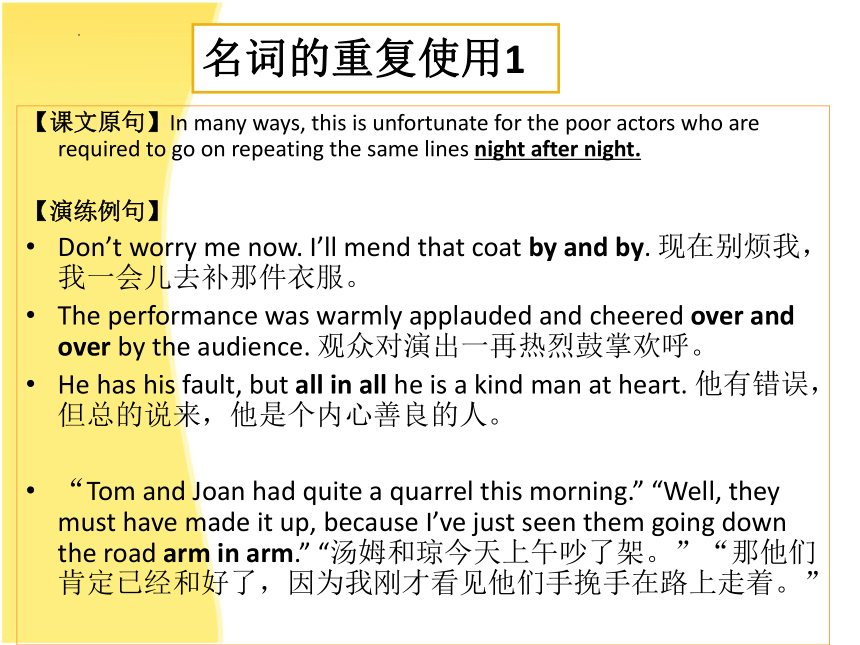
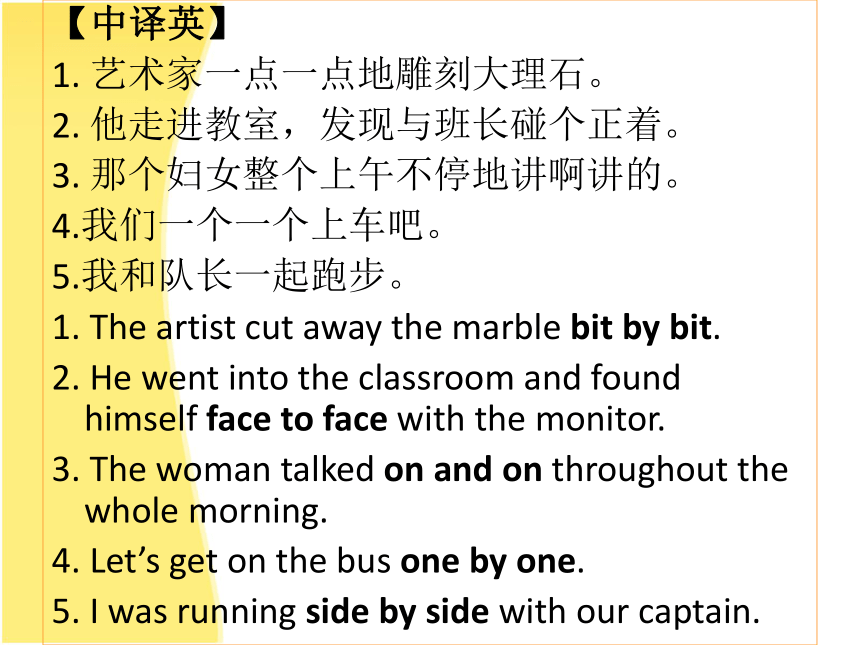
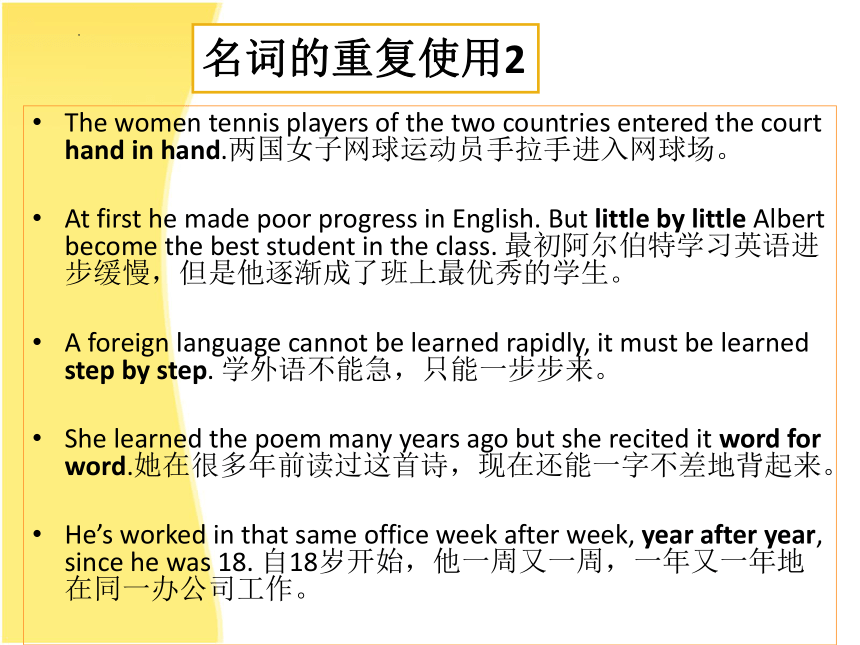
文档简介
(共21张PPT)
"It is not enough to be industrious, so are the ants. What are you industrious for ".
H. D. Thoreau
NEW CONCEPT ENGLISH
LEVEL 3 Lesson 22
By Heart
Faculty of Foreign Languages,NBU
Listen to the tape then answer the questions below
1. What happens to some successful plays
They run years on end.
2. Do actors know their parts by heart
No. It is not always the case.
3. In the final act, what would the gaoler hand to the prisoner
A letter.
4. Why did the gaoler play a joke on his colleague
He wanted to know if he had learn the contents of the letter by heart.
5. What did the gaoler do when he realized that he could not remember the letter
He made an excuse and hurried off the stage to get it.
Contents
Useful Phrases
Vocabulary and Structure
Repetition Exercise
Run for years on end
连续上演好几年
Repeat the same lines night after night
一夜连着一夜重复同样的台词
be cast in the role of…
扮演…角色
come on to the stage
上场
hand sth to
把……交给
be written out in full
全文书写出来
Play a joke on …
拿…开玩笑
Manage to do…
做到…
Learn sth by heart
记住
Useful Phrases
The curtain goes up.
大幕拉开
Present sth to sb.
将……交给……
A blank sheet of paper
一张白纸
Learn one’s lines
记住台词
Squint one’s eyes
眯着眼睛
Hurried off the stage
匆匆下台
Much to the aristocrat’s amusement
使贵族感到非常可笑的是…
Proceed to do sth…
继续做某事
名词的重复使用1
【课文原句】In many ways, this is unfortunate for the poor actors who are required to go on repeating the same lines night after night.
【演练例句】
Don’t worry me now. I’ll mend that coat by and by. 现在别烦我,我一会儿去补那件衣服。
The performance was warmly applauded and cheered over and over by the audience. 观众对演出一再热烈鼓掌欢呼。
He has his fault, but all in all he is a kind man at heart. 他有错误,但总的说来,他是个内心善良的人。
“Tom and Joan had quite a quarrel this morning.” “Well, they must have made it up, because I’ve just seen them going down the road arm in arm.” “汤姆和琼今天上午吵了架。”“那他们肯定已经和好了,因为我刚才看见他们手挽手在路上走着。”
【中译英】
1. 艺术家一点一点地雕刻大理石。
2. 他走进教室,发现与班长碰个正着。
3. 那个妇女整个上午不停地讲啊讲的。
4.我们一个一个上车吧。
5.我和队长一起跑步。
1. The artist cut away the marble bit by bit.
2. He went into the classroom and found himself face to face with the monitor.
3. The woman talked on and on throughout the whole morning.
4. Let’s get on the bus one by one.
5. I was running side by side with our captain.
The women tennis players of the two countries entered the court hand in hand.两国女子网球运动员手拉手进入网球场。
At first he made poor progress in English. But little by little Albert become the best student in the class. 最初阿尔伯特学习英语进步缓慢,但是他逐渐成了班上最优秀的学生。
A foreign language cannot be learned rapidly, it must be learned step by step. 学外语不能急,只能一步步来。
She learned the poem many years ago but she recited it word for word.她在很多年前读过这首诗,现在还能一字不差地背起来。
He’s worked in that same office week after week, year after year, since he was 18. 自18岁开始,他一周又一周,一年又一年地在同一办公司工作。
名词的重复使用2
部分否定
【课文原句】One would expect them to know their parts by heart and never have cause to falter. Yet this is not always the case.
【演练例句】 英语中,表示“整体”、“全部”意义的副词如entirely, always, everywhere, completely, totally, altogether, often, wholly,它们与否定词连用时,表示部分否定。
Such a thing is not found everywhere. 这样的事情并非处处都有。
Women are never to be entirely trusted---not the best of them. 女 人不可以完全信任,哪怕是品德最好的女人。
Joanna doesn’t ignore my request entirely. 乔娜并未完全忽视我的要求。
A man of learning is not always a man of wisdom.
有学问的人并不一定是有智慧的人。
【英译中】
1.We don’t often go to the theatre.
2. The students were not altogether satisfied with the results of the examinations.
3. She doesn’t seem quite what she used to be.
4. This place is not used wholly for raising live stock.
5. This rule does not always hold good.
6. This kind of person is never to be entirely trusted.
1. 我们不经常去看戏。
2. 学生对考试的结果并不完全满意。
3. 她好像并不完全是过去的她。
4. 这地方不是全部用来饲养家畜的。
5. 这一准则并不是永远有效。
6. 这种人决不能完全相信。
连词与句子的分隔
【课文原句】One night, the gaoler decided to play a joke on his colleague to find out if, after so many performances, he had managed to learn the contents of the letter by heart.
【演练例句】
I began to walk away when, moment later, he ran after me and thrust the pen into my hands. 我走开了,可是一会儿,他又追上来,把那支笔塞进我手中。
She was not well when she wrote to you a few days ago, but she didn’t say so because, as you know, she never thinks of herself. 几天前她给你写信时已感到不舒服,但未提及,正如你所知,她从不考虑自己。
If the road were very smooth, if, for example, it were covered with a sheet of ice, the opposition of friction would be less. 如果道路非常光滑,例如路上覆盖有一层冰,摩擦就会比较小。
They would warn him, and, if necessary, would order the cat to be destroyed. 他们就警告他,如果有必要,就会下令把猫除掉。
Since, when a person is in good health, his temperature is kept pretty constantly between 98 and 99 F., it is clear that the body has ways of regulating its temperature.
(since 引人的主体部分“his temperature … 99F.”被when引人的副词从句所分隔。)
The sleeper himself cannot tell what is going on and, even when he wakes, has only a very hazy idea of how the night has passed. (and引人的主体部分“has…passed”被when引人的副词从句所分隔。)
介词with与独立主格结构
【课文原句】
Just then, the gaoler appeared with the precious letter in his hands.
【演练例句】
With the Fonggang Bridge out of service, and two coastal highways blocked by landslides, travelers can only hope to escape the area by air. 枫港大桥中断,南巡公路也塌方不能通车,旅客现在只能期望飞机能飞。
Without a single cent in pocket, I passed the shopping center very quickly. 口袋里一个子也没有,我匆匆离开了购物中心。
A black car with four officers inside it stopped at the camp gate. 里面坐着四个军官的一辆大轿车在营房门口停下来。
She saw a brook with red flowers and green grass on both sides. 她看见一条两岸长着红花绿草的小溪。
【中译英】
我不喜欢没有花的花园。
山后衬托着白云,山多美丽啊。
有这么多人支持,我们一定会取得胜利。
I don’t like a garden without any flowers in it.
How beautiful the hills look with the white clouds behind them.
We are sure to win the victory with so many people behind us.
情感名词与介词to
【课文原句】Much to the aristocrat's amusement, the gaoler returned a few moments later with a pair of glasses and the usual copy of the letter which he proceeded to read to the prisoner.
【演练例句】
To his great surprise and sorrow, he saw that his dear old mother was seriously ill in bed, looking very pale and almost without consciousness.
使他大惊和悲伤的是他看见他亲爱的老母亲病重在床,面色苍白,几乎没有了知觉。
I found to my disappointment that he had left for the east.
我发现他已经东行,大失所望。
Much to his regret, he had found his mistake too late.他深感遗憾的是他没能早一些发现自己的错误。
To his disappointment and disgust, he found that Denny had been drinking and could neither behave nor talk sensibly.
使他感到失望和厌恶的是他发现丹尼一直在喝酒,举止和说话都失去理智。
【中译英】
1. 非常抱歉,我不能接受你邀请。
2. 使我大吃一惊的是他钢琴弹得很好。
3. 让我伤心的是他赞成这个计划。
4. 他的病好了,这让我们喜出望外。
5.让我大为恼火的是他将它打碎了。
1. To my deep regret, I cannot accept your invitation.
2. To my great surprise, he played the piano wonderfully .
3. To my sorrow, he was in favor of the plan.
4. He has recovered, much to our delight.
5. He broke it, greatly to my annoyance.
能够用于这种结构中的情感名词,除了上述提到的以外,常见的还有:satisfaction(满意,满足), horror(恐怖), distress(苦恼,悲痛), shame(羞愧), astonishment(惊奇), vexation(苦恼,恼火)。
与case有关的短语
【课文原句】One would expect them to know their parts by heart and never have cause to falter. Yet this is not always the case.
the case 实情
a case in point 明证,恰当的例证
in any case 无论如何
in case 以防万一
in case of sth. 如果,假使
in that case 既然那样
Q &.A
Line 1-13
… so successful that…on end.
In many ways, … unfortunate…go on repeating…
… expect them to…
…not…the case.
A famous actor…cast in the role of…who…
In the last act, …which…
Even though…expected to…,…insisted … written out in full.
…to play a joke on…, … managed to…
…went up…and revealed…
Just then,… with a precious letter…
Repetition Exercise
Line 13-20
…entered…and presented…
But the copy…as usual…
It was simply…
…looked on eagerly, anxious to…
…stared at…
Then, squinting…
… promptly handed…
Finding that…, … replied…indeed…
With this, …hurried off…
Much to …amusement, … returned …with… and … which…proceeded to…
Repetition Exercise
"It is not enough to be industrious, so are the ants. What are you industrious for ".
H. D. Thoreau
NEW CONCEPT ENGLISH
LEVEL 3 Lesson 22
By Heart
Faculty of Foreign Languages,NBU
Listen to the tape then answer the questions below
1. What happens to some successful plays
They run years on end.
2. Do actors know their parts by heart
No. It is not always the case.
3. In the final act, what would the gaoler hand to the prisoner
A letter.
4. Why did the gaoler play a joke on his colleague
He wanted to know if he had learn the contents of the letter by heart.
5. What did the gaoler do when he realized that he could not remember the letter
He made an excuse and hurried off the stage to get it.
Contents
Useful Phrases
Vocabulary and Structure
Repetition Exercise
Run for years on end
连续上演好几年
Repeat the same lines night after night
一夜连着一夜重复同样的台词
be cast in the role of…
扮演…角色
come on to the stage
上场
hand sth to
把……交给
be written out in full
全文书写出来
Play a joke on …
拿…开玩笑
Manage to do…
做到…
Learn sth by heart
记住
Useful Phrases
The curtain goes up.
大幕拉开
Present sth to sb.
将……交给……
A blank sheet of paper
一张白纸
Learn one’s lines
记住台词
Squint one’s eyes
眯着眼睛
Hurried off the stage
匆匆下台
Much to the aristocrat’s amusement
使贵族感到非常可笑的是…
Proceed to do sth…
继续做某事
名词的重复使用1
【课文原句】In many ways, this is unfortunate for the poor actors who are required to go on repeating the same lines night after night.
【演练例句】
Don’t worry me now. I’ll mend that coat by and by. 现在别烦我,我一会儿去补那件衣服。
The performance was warmly applauded and cheered over and over by the audience. 观众对演出一再热烈鼓掌欢呼。
He has his fault, but all in all he is a kind man at heart. 他有错误,但总的说来,他是个内心善良的人。
“Tom and Joan had quite a quarrel this morning.” “Well, they must have made it up, because I’ve just seen them going down the road arm in arm.” “汤姆和琼今天上午吵了架。”“那他们肯定已经和好了,因为我刚才看见他们手挽手在路上走着。”
【中译英】
1. 艺术家一点一点地雕刻大理石。
2. 他走进教室,发现与班长碰个正着。
3. 那个妇女整个上午不停地讲啊讲的。
4.我们一个一个上车吧。
5.我和队长一起跑步。
1. The artist cut away the marble bit by bit.
2. He went into the classroom and found himself face to face with the monitor.
3. The woman talked on and on throughout the whole morning.
4. Let’s get on the bus one by one.
5. I was running side by side with our captain.
The women tennis players of the two countries entered the court hand in hand.两国女子网球运动员手拉手进入网球场。
At first he made poor progress in English. But little by little Albert become the best student in the class. 最初阿尔伯特学习英语进步缓慢,但是他逐渐成了班上最优秀的学生。
A foreign language cannot be learned rapidly, it must be learned step by step. 学外语不能急,只能一步步来。
She learned the poem many years ago but she recited it word for word.她在很多年前读过这首诗,现在还能一字不差地背起来。
He’s worked in that same office week after week, year after year, since he was 18. 自18岁开始,他一周又一周,一年又一年地在同一办公司工作。
名词的重复使用2
部分否定
【课文原句】One would expect them to know their parts by heart and never have cause to falter. Yet this is not always the case.
【演练例句】 英语中,表示“整体”、“全部”意义的副词如entirely, always, everywhere, completely, totally, altogether, often, wholly,它们与否定词连用时,表示部分否定。
Such a thing is not found everywhere. 这样的事情并非处处都有。
Women are never to be entirely trusted---not the best of them. 女 人不可以完全信任,哪怕是品德最好的女人。
Joanna doesn’t ignore my request entirely. 乔娜并未完全忽视我的要求。
A man of learning is not always a man of wisdom.
有学问的人并不一定是有智慧的人。
【英译中】
1.We don’t often go to the theatre.
2. The students were not altogether satisfied with the results of the examinations.
3. She doesn’t seem quite what she used to be.
4. This place is not used wholly for raising live stock.
5. This rule does not always hold good.
6. This kind of person is never to be entirely trusted.
1. 我们不经常去看戏。
2. 学生对考试的结果并不完全满意。
3. 她好像并不完全是过去的她。
4. 这地方不是全部用来饲养家畜的。
5. 这一准则并不是永远有效。
6. 这种人决不能完全相信。
连词与句子的分隔
【课文原句】One night, the gaoler decided to play a joke on his colleague to find out if, after so many performances, he had managed to learn the contents of the letter by heart.
【演练例句】
I began to walk away when, moment later, he ran after me and thrust the pen into my hands. 我走开了,可是一会儿,他又追上来,把那支笔塞进我手中。
She was not well when she wrote to you a few days ago, but she didn’t say so because, as you know, she never thinks of herself. 几天前她给你写信时已感到不舒服,但未提及,正如你所知,她从不考虑自己。
If the road were very smooth, if, for example, it were covered with a sheet of ice, the opposition of friction would be less. 如果道路非常光滑,例如路上覆盖有一层冰,摩擦就会比较小。
They would warn him, and, if necessary, would order the cat to be destroyed. 他们就警告他,如果有必要,就会下令把猫除掉。
Since, when a person is in good health, his temperature is kept pretty constantly between 98 and 99 F., it is clear that the body has ways of regulating its temperature.
(since 引人的主体部分“his temperature … 99F.”被when引人的副词从句所分隔。)
The sleeper himself cannot tell what is going on and, even when he wakes, has only a very hazy idea of how the night has passed. (and引人的主体部分“has…passed”被when引人的副词从句所分隔。)
介词with与独立主格结构
【课文原句】
Just then, the gaoler appeared with the precious letter in his hands.
【演练例句】
With the Fonggang Bridge out of service, and two coastal highways blocked by landslides, travelers can only hope to escape the area by air. 枫港大桥中断,南巡公路也塌方不能通车,旅客现在只能期望飞机能飞。
Without a single cent in pocket, I passed the shopping center very quickly. 口袋里一个子也没有,我匆匆离开了购物中心。
A black car with four officers inside it stopped at the camp gate. 里面坐着四个军官的一辆大轿车在营房门口停下来。
She saw a brook with red flowers and green grass on both sides. 她看见一条两岸长着红花绿草的小溪。
【中译英】
我不喜欢没有花的花园。
山后衬托着白云,山多美丽啊。
有这么多人支持,我们一定会取得胜利。
I don’t like a garden without any flowers in it.
How beautiful the hills look with the white clouds behind them.
We are sure to win the victory with so many people behind us.
情感名词与介词to
【课文原句】Much to the aristocrat's amusement, the gaoler returned a few moments later with a pair of glasses and the usual copy of the letter which he proceeded to read to the prisoner.
【演练例句】
To his great surprise and sorrow, he saw that his dear old mother was seriously ill in bed, looking very pale and almost without consciousness.
使他大惊和悲伤的是他看见他亲爱的老母亲病重在床,面色苍白,几乎没有了知觉。
I found to my disappointment that he had left for the east.
我发现他已经东行,大失所望。
Much to his regret, he had found his mistake too late.他深感遗憾的是他没能早一些发现自己的错误。
To his disappointment and disgust, he found that Denny had been drinking and could neither behave nor talk sensibly.
使他感到失望和厌恶的是他发现丹尼一直在喝酒,举止和说话都失去理智。
【中译英】
1. 非常抱歉,我不能接受你邀请。
2. 使我大吃一惊的是他钢琴弹得很好。
3. 让我伤心的是他赞成这个计划。
4. 他的病好了,这让我们喜出望外。
5.让我大为恼火的是他将它打碎了。
1. To my deep regret, I cannot accept your invitation.
2. To my great surprise, he played the piano wonderfully .
3. To my sorrow, he was in favor of the plan.
4. He has recovered, much to our delight.
5. He broke it, greatly to my annoyance.
能够用于这种结构中的情感名词,除了上述提到的以外,常见的还有:satisfaction(满意,满足), horror(恐怖), distress(苦恼,悲痛), shame(羞愧), astonishment(惊奇), vexation(苦恼,恼火)。
与case有关的短语
【课文原句】One would expect them to know their parts by heart and never have cause to falter. Yet this is not always the case.
the case 实情
a case in point 明证,恰当的例证
in any case 无论如何
in case 以防万一
in case of sth. 如果,假使
in that case 既然那样
Q &.A
Line 1-13
… so successful that…on end.
In many ways, … unfortunate…go on repeating…
… expect them to…
…not…the case.
A famous actor…cast in the role of…who…
In the last act, …which…
Even though…expected to…,…insisted … written out in full.
…to play a joke on…, … managed to…
…went up…and revealed…
Just then,… with a precious letter…
Repetition Exercise
Line 13-20
…entered…and presented…
But the copy…as usual…
It was simply…
…looked on eagerly, anxious to…
…stared at…
Then, squinting…
… promptly handed…
Finding that…, … replied…indeed…
With this, …hurried off…
Much to …amusement, … returned …with… and … which…proceeded to…
Repetition Exercise
同课章节目录
